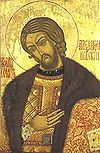- Mikhail Nikolayevich Muravyov
-
Count Mikhail Nikolayevich Muravyov (Muraviev in older spelling; Михаил Николаевич Муравьёв in Russian) (April 19, 1845 - June 21, 1900) was a Russian statesman who advocated transferring the attention of Russian foreign policy from Europe to the Far East. He is probably best remembered for having initiated the Hague Peace Conference.
Mikhail Muravyov was the son of General Count Nicholas Muravyov (governor of Grodno), and grandson of Count Mikhail Nikolayevich Muravyov-Vilensky, who became notorious for his drastic measures in stamping out the Polish insurrection of 1863 in the Lithuanian provinces. He was educated at a secondary school at Poltava, and was for a short time at Heidelberg University.
In 1864, he entered the chancellery of the minister of foreign affairs at St.Petersburg, and was soon afterwards attached to the Russian legation at Stuttgart, where he attracted the notice of Queen Olga of Württemberg. He was transferred to Berlin, then to Stockholm, and back again to Berlin. In 1877, he was second secretary at the Hague. During the Russo-Turkish War of 1877-78, he was a delegate of the Red Cross Society in charge of an ambulance train provided by Queen Olga of Württemberg.
After the war, he was successively first secretary in Paris, chancellor of the embassy in Berlin, and then minister in Copenhagen. In Denmark, he was brought much into contact with the imperial family, and, on the death of Prince Lobanov-Rostovsky in 1897, he was appointed by Tsar Nicholas II to be his minister of foreign affairs.
The next three and a half years were a critical time for European diplomacy. The revolt of Crete against Ottoman rule and events leading to the Boxer Rebellion in China were disturbing factors. Count Muravyov's policy regarding Crete was vacillating; in China, his hands were forced by Germany's action at Kiaochow. He misled Britain concerning the Russian leases of Port Arthur and Talienwan from China; he told the British ambassador that these would be open ports, and afterwards significantly modified this pledge.
When Tsar Nicholas inaugurated the Peace Conference at the Hague, Count Muravyov extricated his country from a situation of some embarrassment in China; but when, subsequently, Russian agents in Manchuria and Peking connived at the agitation which culminated in the Boxer Rebellion of 1900, relations between Muravyov and the tsar became strained. Muravyov died suddenly on June 21, 1900 of apoplexy, brought on, it was said, by a stormy interview with the tsar.
Preceded by
Aleksey Lobanov-RostovskyForeign Minister of Russia
1897–1900Succeeded by
Vladimir Lamsdorf This article incorporates text from a publication now in the public domain: Chisholm, Hugh, ed (1911). Encyclopædia Britannica (11th ed.). Cambridge University Press.
This article incorporates text from a publication now in the public domain: Chisholm, Hugh, ed (1911). Encyclopædia Britannica (11th ed.). Cambridge University Press.People from Russia Leaders and religious - Pre-1168
- 1168–1917
- 1922–1991
- 1991–present
- RSFSR leaders
- General secretaries
- Soviet premiers (1st deputies)
- Soviet heads of state (and their spouses)
- Prime ministers (1st deputies)
- Foreign ministers
- Prosecutors general
- Metropolitans and patriarchs
- Saints

Military and explorers - Field marshals
- Soviet marshals
- Admirals
- Aviators
- Cosmonauts
Scientists and inventors - Aerospace engineers
- Astronomers and astrophysicists
- Biologists
- Chemists
- Earth scientists
- Electrical engineers
- IT developers
- Linguists and philologists
- Mathematicians
- Naval engineers
- Physicians and psychologists
- Physicists
- Weaponry makers
Artists and writers Sportspeople - Chess players
Categories:- Foreign Ministers of Russia
- Russian people of the Boxer Rebellion
- Russian nobility
- Members of the State Council of the Russian Empire
- Deaths from stroke
- 1845 births
- 1900 deaths
Wikimedia Foundation. 2010.

